|
Posted in category "Popes"
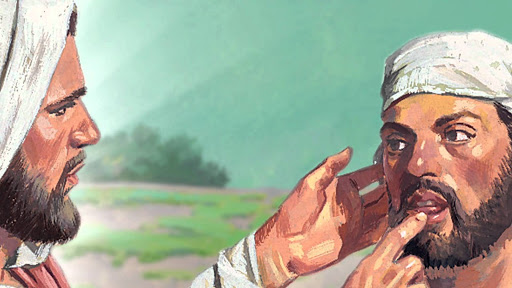
The need to speak, to be heard, to be brought out of silence and isolation into openness to God and others was one of Jesus’ miracles, perhaps one of his most important works. In the Gospel of Mark (7:31-37) there is one small, but very important word – a word that in its deepest meaning sums up the whole ministry and message of Christ. This word, “Ephphatha,” means “Be opened.” The gospel reading says:
“Again Jesus left the district of Tyre
and went by way of Sidon to the Sea of Galilee,
into the district of the Decapolis.
And people brought to him a deaf man who had a speech impediment
and begged him to lay his hand on him.
He took him off by himself away from the crowd.
He put his finger into the man’s ears
and, spitting, touched his tongue;
then he looked up to heaven and groaned, and said to him,
“Ephphatha!”– that is, “Be opened!” —
And immediately the man’s ears were opened,
his speech impediment was removed,
and he spoke plainly.
He ordered them not to tell anyone.
But the more he ordered them not to,
the more they proclaimed it.
They were exceedingly astonished and they said,
“He has done all things well.
He makes the deaf hear and the mute speak.”
The historical and literal meaning of this passage is that, thanks to Jesus’ intervention, a deaf mute’s ability to hear and to speak were restored. Before he had been closed, isolated, and limited in his ability to communicate. His recovery brought him an “openness” to others and to the world, and through his new ability to communicate, he would relate to the world in a new way. On a spiritual level, this passage describes the closing of the deepest core of a person, what the Bible calls the “heart.” It is the heart that Jesus came to liberate— to “open” —to enable us to fully live our relationship with God and with others. It is a gesture of healing we remember and honor every time the Gospel is read: Open my mind, my mouth, my heart, to receive your holy words. 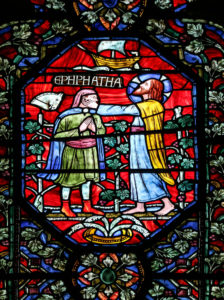
This miracle stands in stark contrast to much of the hierarchy of the church, which does not want to hear what women, gay people and their advocates have to say, which wants to remain deaf, and which also wants these same groups to remain mute. Perhaps the openness that inspires Pope Francis to reach out to people on the margins, to hear the words of different kinds of people, to engage those of us that have been closed off is the miracle for which we have been waiting.
Read the entire article – The Importance of Being Who We Are – Finding Our Place as Catholic Lesbians.
The Importance of Being Who We Are3

The Report on the Holy See’s Institutional Knowledge and Decision-Making Related to Former Cardinal Theodore Edgar McCarrick (1930-2017) was issued by the Vatican’s Secretariat of State on November 10, 2020. The report was authored by U.S. attorney, Jeffrey Lena, who had previously represented the Vatican in several sex abuse cases. The 449-page document is the result of a two-year investigation, prompted by the public demand by Archbishop Carlo Vigano that Pope Francis resign for his alleged leniency to Cardinal McCarrick. Archbishop Vigano’s “testimony” was released on August 25, 2018 and splashed all over ultra-conservative Catholic media outlets. Gossipy and salacious, he pointed the finger at Pope Francis as the chief villain. Since then, the Vatican had been under heavy pressure to provide an explanation for Cardinal McCarrick’s rise, and his continued influence within the Church after rumors and accusations of sexual activity circulated for several decades.
Before his downfall, Cardinal McCarrick was a star among the U.S. Catholic hierarchy, both for his fund-raising prowess and his sophistication about American and global affairs. He brought the Vatican millions of dollars from the U.S. for papal charities.
Who are the main villains in The McCarrick Report?
#1 – Cardinal Theodore McCarrick. A man who used his position, influence, and financial gifts to manipulate or coerce seminarians and altar servers to have sex with him; and protect him from any career consequences. Many of his victims were children of family friends. All of the seminarians depended on his patronage to be ordained.
#2 – Pope John Paul II (1979-2005) – Pope John Paul II turned a blind eye to clerical sexual activity. His main concerns were freeing Poland from communism, keeping communism out of Latin American, and stamping out North American and European reformers and dissenters. His courtiers had free rein, especially after the mid-1990s when he began to suffer from Parkinson’s Disease, and became increasingly incapacitated mentally and physically. His hubris and handlers kept him propped up in Peter’s Throne so the good times could continue to roll. He ignored numerous complains about McCarrick, and continued to promote him from Bishop of Metuchen, NJ (1981), to Archbishop of Newark, NJ (1986), Archbishop of Washington, DC (2000), and finally named McCarrick a cardinal (2001). The best article I ever read about Pope John Paul II’s culpability in the Church’s sex abuse holocaust is Maureen Dowd’s A Saint, He Ain’t. Poland’s bishops lobbied hard for John Paul II’s early beatification and canonization but were rebuffed in 2019 when they petitioned the Vatican and fellow prelates worldwide to have him elevated still further as a Doctor of the Church and patron saint of Europe.
#3 – Cardinal Stanislaw Dziwisz. The McCarrick Report contains 45 references to Dziwisz, who first met McCarrick while visiting New York with the then, Cardinal Karol Wojtyla in 1976. When Karol Wojtyla became Pope John Paul II in 1978, Dziwisz served as his personal secretary for the Polish pontiff’s entire 27-year reign. Cardinal Dziwisz is accused of covering up sexual abuse in exchange for money. One of McCarrick’s victims, James Grein, said he once accompanied McCarrick on a trip to the Vatican with a briefcase containing envelopes full of money. The envelope addressed to Dziwisz held $10,000. 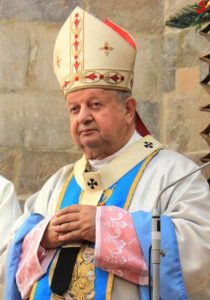
The role of the former papal secretary in stifling sex abuse claims and protecting clerical abusers as favors or for money has come under recent scrutiny in Poland. A 90-minute documentary, “Don Stanislao” was recently shown on TVN24 in Poland. The film aired a long list of accusations about Dziwisz, from covering up for his friends in the seminary to the his role in protecting the late Father Marcial Maciel, the disgraced founder of the Legionaries of Christ, and former Cardinal McCarrick. The documentary also detailed how as archbishop of Krakow he ignored complaints against subsequently convicted local priests.
#4 – Pope Emeritus Benedict XVI – Pope Benedict asked Cardinal McCarrick to step down as archbishop of Washington, DC in 2006. Since he was 76, a year past the age of retirement, the request wasn’t extraordinary. “Over the next two years, Holy See officials wrestled with how to address issues regarding Cardinal McCarrick,” the report’s summary states. “Ultimately, the path of a canonical process to resolve factual issues and possibly prescribe canonical penalties was not taken,” the summary concludes. “Instead, the decision was made to appeal to McCarrick’s conscience and ecclesial spirit by indicating to him that he should maintain a lower profile and minimize travel for the good of the Church.” That didn’t happen; McCarrick continued his global lifestyle and high visibility.
Pope Benedict did and said nothing. Benedict also gave himself the excuse that McCarrick was already retired in not initiating formal disciplinary proceedings. “God’s Rottweiler” as the head of the Congregation for the Doctrine of the Faith (1981-2005) silenced and censored numerous theologians, bishops, priests and religious during his tenure. He decried secularization, liberation theology, feminism, homosexuality, religious pluralism, and bioethics. He gave clerical sex abuse and rape a pass.
#5 – Four New Jersey Bishops. These men vetted Archbishop of Newark McCarrick for the prestigious Washington, DC appointment—Bishop Emeritus Edward Hughes, Metuchen; Bishop John M. Smith, Trenton; Bishop James McHugh, Camden; and Bishop Vincent DePaul Breen, Metuchen. Of the four, only Bishop Edward Hughes advised that it would be “unwise to consider the Archbishop for any promotion or additional honor.” Even so, Bishop Hughes did not pass on reports from seminarians and priests who told him they had been abused by McCarrick. Both James McHugh of Camden and John Smith of Trenton witnessed McCarrick groping a seminarian at a dinner party but never reported it. 
All the New Jersey bishops confirmed the rumor that McCarrick persuaded seminarians to share his bed at his New Jersey Shore house. The Vatican report does not explain by these bishops would not regard sleeping with young men—at minimum–as a serious impropriety and lack of judgement. Nor does it indicate why it didn’t raise a red flag for sexual activity for Vatican officials. The report also included an allegation by an unnamed Metuchen priest who accused McCarrick of having sex with a third priest in June 1987. The accuser was not originally believed since he “had previously abused two teenage boys.”
As expected, The McCarrick Report has plenty of dirt to throw on the legacy of Pope Saint John Paul II: he didn’t bother to investigate sex crimes. That way, he never had sufficient evidence requiring him to act. Because he chose to look the other way, thousands of children, teenagers, seminarians, and vulnerable adults were victimized by clerical predators. The failure of his moral leadership deeply wounded the Catholic Church and many people of faith.
The Report highlights repeated failures in the processing of vetting bishops, a process that often seems more focused on personal connections and ensuring unquestioned adherence to doctrine rather than raising red flags on inappropriate or criminal behavior.
The system in place where archbishops are expected to police abuse by bishops is totally inadequate.
Finally, it shows how certain Vatican prelates—Cardinal Dziwisz and Cardinal Sodano chief among them—were happy to let crime and sin slide if they were paid.

“Homosexuals have a right to be part of a family,” said Pope Francis. They’re children of God and have a right to a family. Nobody should be thrown out or be made miserable because of it. What we have to create is a civil union law. That way they are legally covered,” he continued. “I stood up for that.”
The pope’s remarks were aired in Francesco, a documentary on the life and ministry of Pope Francis which premiered October 21, 2020 as part of the Rome Film Festival. The film included a story about the pope encouraging two Italian men to raise their children in their parish church. One of the men, Andrea Rubera, said he gave Pope Francis a letter that described conversations he and his partner were having over whether to take their children to church, fearing they might be subject to unfair judgement as children of a gay couple. Rubera said the pope called him and encouraged them to take their children to church and to be honest with the pastor about their living situation.
The pope’s comments rocked the Catholic world. Pope Francis clearly stated gay and lesbian people have a right to civil unions. They also have a right to be part of a family. This stance put him in direct opposition to many U.S. bishops and pastors who believe gay people should be driven away or at least kept in the closet and silenced. The Catholic hierarchy and conservative media will continue to campaign against gay marriage and adoption, but they look over their shoulder doing so…they don’t have the full blessing of “truth” and free rein to hurt and slander. Doing so could really impact their clerical career and prospects while this pope is in charge. 
No red hat for culture warriors that focus on gay marriage and abortion but are silent on poverty, prejudice, and environmental degradation. Pope Francis’ statement has reframed the whole discussion of pastoral ministry to gay and lesbian people. In countries where homosexuality is against the law, it has effectively stifled bishops from speaking out in support of these laws.
Contrast the pope’s attitude on civil unions and those of the two previous popes. In 2003, The Congregation for the Doctrine of the Faith (CDF) declared in Considerations Regarding Proposals to Give Legal Recognition to Unions Between Homosexual Persons: “The Church teaches that respect for homosexual persons cannot lead in any way to approval of homosexual behavior or to the legal recognition of homosexual unions…Legal recognition of homosexual unions or placing them on the same level as marriage would mean not only the approval of deviant behavior, with the consequence of making it a model in present-day society, but would also obscure basic values which belong to the common inheritance of humanity.” The statement was drafted by the future Pope Benedict XVI and approved by Pope John Paul II.
As big a bombshell as this papal turnaround on gay and lesbian rights and relationships is, nothing will ever equal the impact of Pope Francis’ “Who am I to judge?” comment in July 2013.
On a plane on the way home from World Youth Day in Brazil, Pope Francis stood and took questions from reporters. One of them concerned his hand-picked appointment for the Vatican bank, Italian Msgr. Battista Ricca. Msgr. Battista had been selected by the pope to help clean up the Vatican bank; a total cesspool of corruption and mob influence. Almost immediately stories about Msgr. Ricca’s lovers and sexcapades began to appear in Catholic media outlets. In response to a question about his candidate, here is what Pope Francis said: “If someone is gay and he searches for the Lord and has good will, who am I to judge?” Francis told reporters, speaking in Italian but using the English word “gay.
In the 2016 book, The Name of God is Mercy, Pope Francis elaborated on his history-making remarks: “On that occasion I said this: If a person is gay and seeks out the Lord and is willing, who am I to judge that person?” the pope says. “I was paraphrasing by heart the Catechism of the Catholic Church where it says that these people should be treated with delicacy and not be marginalized.”
“I am glad that we are talking about ‘homosexual people’ because before all else comes the individual person, in his wholeness and dignity,” he continues. “And people should not be defined only by their sexual tendencies: let us not forget that God loves all his creatures and we are destined to receive his infinite love.”
“I prefer that homosexuals come to confession, that they stay close to the Lord, and that we pray all together,” says Francis. “You can advise them to pray, show goodwill, show them the way, and accompany them along it.”
Asked whether there is an opposition between truth and mercy, or doctrine and mercy, the pontiff responds: “I will say this: mercy is real; it is the first attribute of God.”
“Theological reflections on doctrine or mercy may then follow, but let us not forget that mercy is doctrine,” says the pope. “Even so, I love saying: mercy is true.”
There was a huge response around the world to the Pope’s remarks on gay people’s right to a legal recognition of their relationships, and also to participate in society as families. Before these statements are scattered and lost, I wanted to compile a sampling of reactions for a permanent record.
Lesbian and Gay Rights Groups
“This is wonderful news for the LGBT community and for their families. What Pope Francis is telling us is that lesbian and gay people are part of families. He’s holding up family values and this is so important. Progress takes time and this is a step in the right direction. I am elated that Pope Francis is making this public statement. He’s speaking from the heart.” Sister Jeannine Gramick, SL, co-founder, New Ways Ministry
“New Ways Ministry gratefully welcomes Pope Francis’ latest support for civil unions for same-gender couples. It is a historic moment when the leader of the Roman Catholic Church, long seen as a persecutor of LGBT people, moves in such a supportive direction for lesbian/gay couples and their families. It signals that the church is continuing to develop more positively its approach to LGBTQ issues.” Francis DeBernardo, executive director, New Ways Ministry
“While pleased with the news reports, we wonder how the Pope’s comments fit with existing Catholic teachings that condemn same-sex relationships as ‘intrinsically evil.’ We hope that Pope Francis will take steps to enshrine support for same-sex couples, LGBTQI individuals, and our families in official Catholic teachings and will work to formally end Catholic teachings that are hurtful to LGBTQI people.” Dignity USA
“Remember, the most important issue there is love. LGBT people hold the blood of the family, so they belong. If you think they are sinners, it’s not your duty to judge the sinners. I think he has given me a reason for not changing my religion or going to any other church. It gives me courage.” Ssenfuka Joanita Warry, Faithful Catholic Souls Uganda
“Pope Francis took a significant step for inclusion and acceptance in the Catholic Church by embracing unions for same-sex couples and affirming that LGBQI Catholics are part of their religious family.” Alphonso David, president, Human Rights Campaign
Political Leaders
“Time will tell, but I believe that Pope Francis’ support for same-sex unions will ultimately have a profound impact on how gays and lesbians are treated around the world. The Pope’s views, heard by over one billion Catholics worldwide, have incredible power.” Samantha Power, former U.S. ambassador to the United Nations
“The church does not prepare dogma or doctrine via documentaries. That happens when the pope sits down behind his desk.” The pope’s comments “follow years of misery and homophobia suffered by LGBTIQ people who, with Catholic people, have turned the tide. The pope has seen that tide. Let him now follow through.” Mary McAleese, former president, Republic of Ireland
Theologians
“The pope’s statement of encouragement for legal civil unions could very well have a great impact in parts of the world where same-sex relationships are criminalized. In predominantly Catholic nations where homophobia is the law, this statement could undercut anti-gay legislation, and perhaps even lead to its repeal. That would be a great good.” Lisa Fullam, professor of Moral Theology, Jesuit School of Theology, Santa Clara University
“Pope Francis once again is showing that the heart of the Church must be welcoming. It is a colossal step for the pontiff to endorse civil unions. In doing so, he shows that he, and in turn, the Church, are looking for ways to be a welcoming place for all LGBT Catholics. All Catholics should applaud this advancement.” Aaron Bianco, professor of theology, University of San Diego (Bianco was forced to resign as a pastoral associate at a parish in San Diego after he faced a barrage of attacks from anti-LGBT news sites.)
“Such informal remarks are to be praised as a timely shift in-line with overwhelming theological evidence and a growing acceptance of the lived reality of same sex love and partnership by a majority of Catholics worldwide. It should be noted however, that these personal comments are in direct contradiction with current Catholic teaching, according to which same-sex orientation is “intrinsically disordered,” and same-sex relationships are always “intrinsically evil.” We urge Pope Francis to kick-start a process to revise official Catholic teaching and practice so that his latest overtures towards acceptance are transformed into concrete change.” The Wijngaards Institute for Catholic Research
“These words from the pope will inflame many on the Catholic right…but they will be a balm to the vast majority of Catholics and, I daresay, pastors. They don’t want to engage in these ugly culture war battles, especially because gay Catholics are not abstractions—they are in their homes, part of their families, and part of their parishes.” David Gibson, director, Center on Religion and Culture, Fordham University
“I see this as a necessary step in the evolution of the church’s thinking on same-sex issues… it’s a sign of hope that the church can change. It can grow. It can evolve. I think it’s also a sign of hope that especially in places where LGBTQ persons are more actively persecuted, this is a sign of hope that that kind of persecution cannot be reconciled with the Christian faith.” Bryan Massingale, professor of Theology, Fordham University
“(It is a big deal) in part because the Holy Father is clearly representing such civil unions as a good and desirable thing, to be actively promoted, rather than a lesser evil. And second because he affirms the rightness of same-sex couples forming a family and being part of the family of the Church. This will evidently create waves in countries where homosexuality is illegal, as well as cause heartache to rigorist Americans who have sought legal exemption from employing same-sex couples who have entered into legal unions.” James Allison, author, and theologian
Writers, Commentators, Bloggers
“The Holy Father has changed the tone, the approach and the conversation around the issue of LGBTQ Catholics. He is not changing doctrine, but he is changing the conversation, and that is a form of teaching.” James Martin, S.J., writer and editor-at-large, America magazine
“Once again, Pope Francis is spreading confusion among the faithful. How many times must this happen before all good Catholics recognize that we have a serious problem in the Church, and its name is Francis? And radical Catholics, who really do want to overturn established dogma, rub their hands gleefully and seize another opportunity.” Phil Lawler, editor, Catholic World News, and commentator, CatholicCulture.org
“Before I make some pointed remarks about Pope Francis’ latest demonstration of inadequacy, let me make one thing perfectly clear…If we are Catholic but have not prayed regularly for Pope Francis, we have no right to complain. Do we think Satan does not specifically target the successor of Peter?… The latest outrage to the Catholic faith, reason and sensibilities is the Pope’ remarks in a new video documentary in which he insists that homosexual persons have the right to a family, and that the important thing is to establish civil union legislation so they are ‘legally covered.’” Jeff Mirus, founder, Trinity Communications, which runs CatholicCulture.org; co-founder, Christendom College
“So instead of getting all upset and hysterical about this, we should take that for what it is. It was a mistake by a man with good intentions but who just got it wrong. He was trying to give expression to his long-standing desire that we reach out to and include those who are marginalized or alienated from the Church or society. It was an unforced error, and it will have to be corrected either by the Holy Father, his press team, or our own bishops. It’s an opportunity for all of them to publicly reaffirm the true teaching of the Church, which would at least bring some good out of the situation.” Ed Mechmann, Director of Public Policy and the Safe Environment Program &blogger, Archdiocese of New York
“This little, very possibly perverted, Church-hating, Christ-hating, Catholic-hating bastard…Next on his plate, I suspect, bestiality, incest, and (you guessed it) coprophagia.” Mundabor’s Blog – “This blog’s aim is to allow true, traditional, unadulterated, strictly orthodox Catholic doctrine.”
“Unfortunately, Homosexuals do not have a right to family life since they forfeit family life by mocking and forsaking family life through their LGBT activity. Nor do they have a moral right to be around others as long as they are infected with these sodomite aspirations…Francis calls homosexuals the “children of God” deceptively implying they are affectionately embraced by God as they are when in fact they are children of the devil doing the works of the devil, for which they would be forever banished if someone didn’t come along in true charity to encourage them onto the right and shining path. Unfortunately, the pope’s Trump-bashing/pro-LGBT statements occur just at a time when it could swing the Catholic vote in America over to pro-LGBT Joe Biden and thus help bring about the downfall of America and consequently the world. The devil indeed is playing chess on the political board so we pray the Francis’ anti-family statements do not influence the vote in America but that Americans remain ever resolved to vote for Donald Trump who is committed to preserving traditional family values. David Martin, The Eponymous Flower blog
Cardinals and Bishops
“The Pope’s Statement clearly contradicts what has been the long-standing teaching…The Church cannot support the acceptance of objectively immoral relationships.” Bishop Thomas Tobin, Diocese of Providence, Rhode Island
“The Holy Father is very aware of the suffering and alienation of homosexual individuals, gay people, who are rejected by family and society. He is also keenly aware of the parents and loved ones who also suffer because a member of their family is bullied or marginalized for being different.” Cardinal Sean O’Malley, Archdiocese of Boston, Massachusetts
“It makes me very happy that a new door is opening in the church for people who still don’t have a place in it because God is going to ask about them. It is very important that we initiate a new stage in the relationship of the Catholic Church with the LGBT family in the world.” Bishop Raul Vera, Diocese of Saltillo, Mexico
The Pope seems to be emphasizing that we are called to find ways of extending a true sense of family to those who find themselves on the margins, so that they might experience the security of belonging and the joy of encountering the life-changing mercy of Jesus Christ.” Archbishop Bernard Hebda, Archdiocese of St. Paul and Minneapolis, Minnesota
“There are in other countries very strong homophobic tendencies even in church leaders. And what I find, even here ourselves, we have some people whose frustration with their own gay identity is leading them to be homophobic in ways. So, the first thing I’d say is that the Pope is clearing the air for a further discussion. After the same sex marriage referendum here in Ireland I talked about the ideas of a reality check. And this again would be an opportunity for people to do a reality check within the church.” Archbishop Diamuid Martin, Archdiocese of Dublin, Ireland
“The Holy Father is calling us as Church, as he has on numerous other occasions, to begin with the human person. Catechesis is important, but no the starting point. Building relationships comes first, then instruction, conversion, and integrating the faith ever more deeply into one’s life. In a real way he is challenging the Church to expand the tent. The Holy Father has from the beginning of his pontificate encouraged the Church to welcome all people as children of God who are deserving of love and respect. Indeed, this is what the Catechism of the Catholic Church teaches. Finally, this is very much in keeping with Pope Francis’ encouragement to be a Church that accompanies one another. Our Holy Father envisions a compassionate Church, one with a maternal heart, willing to overcome insecurity, fear, and a willingness to reject others. Rather, we are called to be a Church that attracts and welcomes others with the love of Christ.” Archbishop Paul Etienne, Archdiocese of Seattle, Washington
Censor Liborum, Nihil Obstat
Very few U.S. bishops issued a statement in response to Pope Francis’ statement. A few were negative, some positive, all were nuanced and guarded. No one wants to make waves within the U.S. Conference of Catholic Bishops (USCCB), since conservative bishops still hold a voting edge. But as more Pope John Paul II and Benedict VI appointees retire or die off—and if Pope Francis can remain pope for another 5-7 years–we can expect a new crop of more pastorally-minded bishops to dominate the USCCB. They will bring a wider review of social justice issues beside abortion, same-sex marriage, and to a much smaller degree, immigration, and the death penalty. As old bishops depart and modern bishops arrive, I expect more of them to add racism, economic problems, and environmental concerns to their own and the USCCB’s agenda. In the meantime, most bishops will do what they have always done: keep their heads down, try not to notice bad behavior, teach in mild ways, tend to their cash flow, and try to benefit from politics without getting too involved. They also need to weigh how it will affect their career prospects if they publicly agitate against lesbian and gay civil unions. 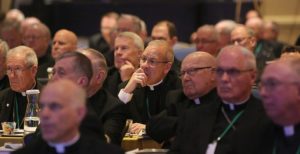

I received this mailer from Catholic Vote. I’m sure they got my name from my subscription to the National Catholic Register. I am a pro-life voter–not just a pro-birth voter. Catholic Vote started out as a Pope Benedict fan club. They have now evolved into some kind of conservative Catholic PAC.
When presented with such a stark choice for candidates it’s very easy to pick: NANCY PELOSI, and the fundamental Catholic values and upbringing she represents.
How on earth, as a faithful Catholic, could I vote for what Donald Trump, Ronald Reagan and John Paul II represent:
Donald Trump – A coarse, nasty, misogynist, pathological liar.
Ronald Reagan – The man who destroyed the American working class by opening the floodgates to globalization and corporate maximization of profits vs. giving people at home a decent living wage.
Pope John Paul II – Ignored or protected priestly predators and their enablers while thousands of innocent children, teens and seminarians were raped and sexually abused. Under his watch the Vatican bank was a den of thieves washing dirty money and funding luxurious lifestyles for corrupt prelates. And don’t forget–he never met a military dictatorship he didn’t prefer over poor peasants and indigenous peoples.
Catholic Vote needs to rethink their presentation materials.
The chronicler William of Nangis describes the trial and execution of Marguerite Porete, 1310: 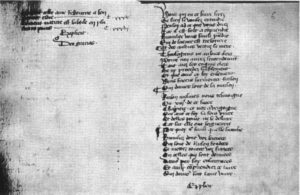
“Around the feast of Pentecost is happened at Paris that a certain pseudo-woman from Hainault, named Marguerite and called ‘la Porete,’ produced a certain book in which, according to the judgement of all the theologians who examined it diligently, many errors and heresies were contained; among which errors (were the beliefs), that the soul can be annihilated in the love of the Creator without censure or conscience or remorse and that it ought to yield to whatever by nature it strives for and desires. This (belief) manifestly rings forth as heresy. Moreover, she did not want to renounce this little book or the errors contained in it, and indeed she even made light of the sentence of excommunication laid on her by the inquisitor of heretical depravity, (who had laid this sentence) because she, although having been lawfully summoned before the bishop, did not want to appear and held out in her hardened malice for a year and more with an obstinate soul. In the end her ideas were exposed in the common field of La Greve through the deliberation of learned men; this was done before clergy and people who had been gathered specially for this purpose, and she was handed over to the secular court. Firmly receiving her into his power, the provost of Paris had her executed the next day by fire. She displayed many signs of penitence, both noble and pious, in her death. For this reason, the faces of many of those who witnessed it were affectionately moved to compassion for her; indeed, the eyes of many were filled with tears.”
Marguerite
Marguerite Porete was a 14th century French mystic who wrote a book entitled “The Mirror of Simple Annihilated Souls and Those Who Only Remain in Will and Desire of Love.” Written during the 1290s, the book was condemned by the French Inquisition as heretical. Marguerite was jailed for a year and a half and asked to recant. When she refused to respond to her inquisitors, she was condemned to death. 
The book provoked controversy, likely because of statements such as “a soul annihilated in the love of the Creator could, and should, grant to nature all that it desires,” which some took to mean that a soul can become one with God and that when in this state it can ignore moral law, it had no need for the Church and its sacraments or code of virtues. This is not what Marguerite taught, since she explained that souls in such a state desired only good and would not be able to sin.
Not much is known about Marguerite’s early life, except that she was born in Hainault in what is now Belgium around 1248 or 1250. She lived during different periods in Valenciennes, Lorraine, Reims and Paris. She seems to have been a stubborn woman, determined to share her ideas despite ecclesiastical censure. I don’t know why she refused to speak to her inquisitors during her trial and captivity. It may have been disdain or defiance, or it may have been to induce a similar helplessness and frustration in her persecutors. She refused to participate in an outcome that they had already decided.
Tina Beattie, professor of Catholic Studies at Roehampton University, London, said: “Little is known about Porete, apart from the record of her trial and what can be gleaned from her writings. It seems likely she was associated with the Beguines, a women’s religious movement which spread across northern Europe during the 13th and 14th centuries. Although the Beguines devoted themselves to charity, chastity and good works, they took no religious vows and their lifestyles varied greatly, from solitary itinerants (of which Porete was likely one) to enclosed communities. The Beguines were part of an era of vigorous spiritual flourishing during the Middle Ages. They were condemned by the Council of Vienne (1311-1312), which also condemned the Free Spirit Movement with which the Beguines were sometimes (and probably erroneously) identified.”
Her Killers – Bishops, Inquisitor, King
Gui de Colle Medio (or de Colmier) was bishop of Cambrai from 1296-1306. He condemned The Mirror and ordered it publicly burned in Marguerite’s presence in Valenciennes. She was ordered not to circulate her ideas or the book again.
The next bishop of Cambrai, Philippe de Marigny, made her life worse. His persecutions combined politics and religion. Philippe Le Portier de Marigny was appointed bishop of Cambrai in 1301 and archbishop of Sens in 1309. His half-brother, Enguerrand de Marigny, Baron Le Portier, was the chamberlain and chief minister to Philip IV, the king of France. Enguerrand was influential in obtaining these appointments for his brother. Philippe de Marigny became an important figure in the trials of the Knights Templar, and in the execution of Templar’s grand master, Jacques de Molay. De Molay was burned alive with three other Templar leaders on a scaffold in front of Notre Dame Cathedral on March 18, 1314. He uttered his famous curse, and both King Philip IV and Pope Clement V followed him to death (and judgement) within a year. The new king of France, Louis X, had Enguerrand de Marigny hanged for sorcery in April 1315. 
Marguerite Porete’s main persecutor and tormenter was the Inquisitor William of Paris, also known as William of Humbert. This Dominican priest and theologian was the confessor to King Philip IV. Appointed Inquisitor in 1303, William also played an important role in the trials and persecution of the Knights Templar. Interestingly, William died in 1314, the same year as Jacques de Molay, King Philip IV and Pope Clement V. Perhaps Molay included him in his curse.
The piety and politics of King Philip IV helped shape the deaths of Marguerite and the Knights Templar. Many of the enemies of the crown were cast as heretics; a convenient label for a self-appointed defender of the Faith. William of Paris supported the political machinations of the French king by suppressing the Knights Templar. The King aided the Dominican’s interests in ridding him of Marguerite—an independent and potentially dangerous religious voice. 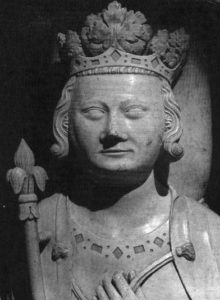
Arrest and Trial
In 1308 William had Marguerite Porete arrested along with a Beghard, Guiard de Cressonessart, who was also put on trial for heresy. Their trial began early in 1310 after they were held in prison in Paris for a year and a half. Under tremendous pressure, de Cressonessart eventually confessed and was found guilty. Marguerite refused to recant, withdraw her book or cooperative with the authorities, refusing to take the oath required by the Inquisitor to proceed with the trial. William was not going to have any easy time proving her a heretic. Marguerite had consulted three church authorities about her writing and gained their approval, including the highly respected Master of Theology Godfrey of Fontaines at the University of Paris. Godfrey’s involvement was an important factor in William’s handling of the trial, requiring him to build his case as carefully as possible. He consulted over 20 theologians—an excessive number–on the question of The Mirror’s orthodoxy. 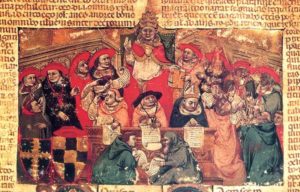
Death
On May 31, 1310 William of Paris read out a sentence that declared Marguerite “called Porete,” a beguine from Hainault, to be a relapsed heretic and released her to secular authority for punishment. He ordered all copies of a book she had written to be confiscated. William called her a “pseudo-mulier” (fake woman) and described The Mirror as “filled with errors and heresies.” William next consigned Guiard de Cressonessart, a would-be defender of Marguerite to life imprisonment. Marguerite condemned to be burnt at the stake as a relapsed heretic. On June 1, 1310 Marguerite was burned alive along with a relapsed Jew at the Place de Greve – today the Place de l’Hotel de Ville – in Paris. 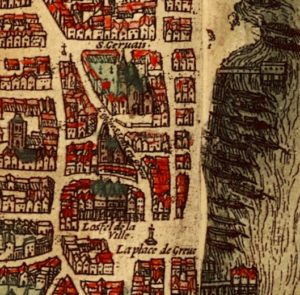
Why Was Marguerite a Target?
There are several possible reasons why so much effort was made to put Marguerite on trial and kill her.
- A growing hostility to the Beguine movement by Franciscans and Dominicans. Beguines were lay religious women who were not under male authority and direction and were outside civic and ecclesiastical structures. In 1311—the year after Marguerite’s death—ecclesiastical officials made several specific connections between Marguerite’s ideas and deeds and the Beguine status in general at the Council of Vienne.
- The popularity of The Mirror of Simple Souls gave Marguerite a prominent profile other lay writers didn’t possess. She also wrote in French, not Latin.
- Marguerite’s perceived association with the Free Spirit Movement or Brethren of the Free Spirit. Free Spirits were not a single movement or school of thought, but they caused great unease among churchman. They were considered heretical because of their antinomian views. One of beliefs some Free Spirits held is that they could not sin by having sexual relations with any person. Extracts of The Mirror of Simple Souls were cited in the bull Ad Nostrum issued by the Council of Vienne to condemn the Free Spirit movement as heretical.
Was there a whiff of homophobia in William of Paris’ denunciation of Marguerite as a “pseudo-woman”?
Marguerite Porete’s era is a mirror to our own. 40 years ago conservative political and religious leaders like President Ronald Regan and Pope John Paul II colluded on major political actions and social change. Lay Catholics began to search for new ways to experience a direct relationship to God. Many of these explorations were condemned since they were outside of traditional structures. The prevailing norms of sexual and gender expression were openly questioned by ordinary people. Sex and sexuality are fraught and fearful topics for the Catholic hierarchy, and many bishops tried their best to suppress them. Their best allies were presidents focused on wealth and expansion. Today, President Trump sounds and acts a lot like King Philip IV.
We can point to one improvement in the last 700 years. We can no longer be burned at the stake. 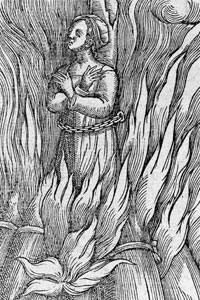
Further Reading:
The Beguine, the Angel, and the Inquisitor: The Trials of Marguerite Porete and Guiard of Cressonessart by Sean L. Field
Allegories of Love in Marguerite Porete’s ‘Mirror of Simple Souls’ by Suzanne Kocher
A Companion to Marguerite Porete and the Mirror of Simple Souls by Robert Stauffer and Wendy R. Terry
The World on the End of a Reed by Francesca Caroline Bussey
The Heresy of the Free Spirit in the Later Middle Ages by Robert E. Lerner
Courting Sanctity: Holy Women and the Capetians by Sean L. Field
Transmitting the Memory of a Medieval Heretic: Early Modern French Historians on Marguerite Porete by Danielle C. Dubois
Marguerite Porete: The Mirror of Simple Souls by Ellen Babinsky
Pope Benedict XVI has contributed content to a new book, From the Depths of Our Hearts, which appears along with an essay by Cardinal Robert Sarah, the prefect of the Congregation for Divine Worship. The book, which was released this week, is an emotional defense of priestly celibacy. 
In an amazing coincidence, the book comes while Pope Francis is considering the possibility of allowing older, married men to be ordained as priests in the Amazon region.
What wasn’t mentioned in the book is an action Pope Francis’ predecessor, Benedict XVI, took almost 9 years ago to the day the book was published: he welcomed married Anglican priests who planned to convert to Catholicism. In other words, the same Benedict that is writing from the depths of his heart on the need for priestly celibacy was the first pope to allow married Anglican priests who converted to Catholicism to serve as Catholic priests. A small but revealing point: these same men left the Church of England because they wholeheartedly disagreed with the ordination of women and openly gay priests.
If this isn’t bad/funny enough, Cardinal Sarah and Archbishop Georg Ganswein, Pope Benedict’s good-looking and long-time private secretary, are engaged in a slap-fest over Benedict’s participation in the book. Did Cardinal Sarah use the 92-year-old, frail and mentally diminishing Pope Benedict in a fight against Pope Francis and/or to prop up book sales?
Archbishop Ganswein openly contradicted Cardinal Sarah’s official account of the genesis of the book, issuing a “clarification” on January 14, 2020 saying that while Pope Emeritus Benedict was certainly aware of Cardinal Sarah’s plan to produce a book on celibacy, Benedict “did not approve a project for a co-authored book and he had not seen or authorized the cover.” Archbishop Ganswein disclosed that he had, at the former pope’s request, asked Ignatius Press to remove the name of Benedict XVI as co-author of the book. Cardinal Sarah took a step back when he announced the same day on Twitter: “Considering the controversies that the publication of the book From the Depths of Our Hearts has provoked, it is decided that the author of the book for future publications will be: Cdl. Sarah, with the contribution of Benedict XVI.” So far, the publishers are standing firm with Pope Emeritus Benedict XVI as co-author. 
Cardinal Sarah’s pal, Archbishop Carlo Maria Vigano, has denounced Archbishop Ganswein for what he calls his “abusive and systematic control” of the pope emeritus. Of course, Vigano may still be smarting from the time Archbishop Ganswein told news media that contrary to Vigano’s claim, Pope Benedict did not confirm Vigano’s “testimony” on Pope Francis and the Cardinal McCarrick scandal. Ganswein said the whole thing was “fake news.”
Isn’t it fun to watch conservative prelates go picnicking on one another!

The Truth hurts!
The author missed my favorite: “The Church is not a museum.” (Pope Francis’ opening sentence at the Synod on the Family.)
Enjoy the Little Book of Insults here.

Pope Francis continues to move Catholicism from irrelevant to part of ordinary life. A large part of this change is his focus on family, emphasizing warm pastoral care over purity and sexual sins. The switch will help to stem the flow of people, especially young people, out of the Church. 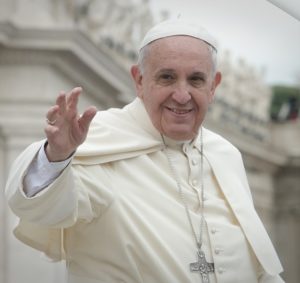
The latest change began with his September 8, 2017 Apostolic Letter, Summa Familiae Cura, where he modified the name of Pope John Paul II’s Institute on Marriage and Family and started the process of changing its statutes. The new name is the Pontifical John Paul II Theological Institute for Matrimonial and Family Sciences. 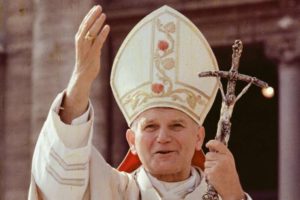
Summa Familiae Cura has the flavor of Pope Francis’s two previous Apostolic Exhortations: Evangelii Gaudium (The Joy of the Gospel), published in 2013 and especially Amoris Laetitia (The Joy of Love), published in April 2016. It is obvious that Pope Francis intended the newly renamed institute to heavily incorporate Amoris Laetitia into its curriculum and culture. The Institute will also broaden its educational focus from theology to include “family sciences.” This passage on the first page of Summa Familiae Cura must have given conservatives a chill:
“Anthropological-cultural change, that today influences all aspects of life and requires an analytic and diversified approach, does not permit us to limit ourselves to practices in pastoral ministry and mission that reflect forms and models of the past. We must be informed and impassioned interpreters of the wisdom of the faith in a context which individuals are less well supported than in the past by social structures, and in their emotional and family life. With the clear purpose of remaining faithful to the teaching of Christ, we must therefore look, with the intellect of love and with wise realism, at the reality of the family today in all its complexity, with its lights and shadows.”
Several phrases leap out: The Church would no longer “limit ourselves to practices in pastoral ministry and mission that reflect forms and models of the past.” That statement opened the door to new ways of accompanying people through challenges in their lives. “With the clear purpose of remaining faithful to the teaching of Christ…” That sentence signals a dramatic philosophical shift in attitude from the usual clerical admonishment to adhere to the teaching of the Magisterium. 
The pope announced that he would broaden the Institute’s studies and coursework. While the graduate school’s curriculum had previously centered on the theology of marriage and the family, it will be changed to incorporate social sciences and other approaches to studying the family. The licentiate and doctoral programs have been retained, but there is no explicit reference in the new statutes to John Paul II, his Theology of the Body, or Humanae Vitae. New faculty will be added. Pope Francis appointed Archbishop Vincenzo Paglia as Grand Chancellor of the refounded JPII Institute. Archbishop Paglia is now firmly in charge of curriculum and hiring. The revamped Institute will promote the thought of Pope Francis, and open windows and doors to the lived experience of Catholic families–not an idealized one promoted by celibate clerics. 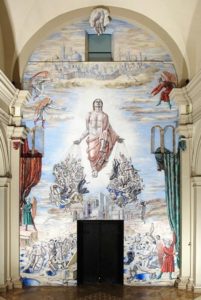
The appointment of Archbishop Paglia must stick in the craw of a lot of conservative Catholics. Archbishop Paglia was the President of the Pontifical Council for the Family from 2012 to 2016 and Bishop of Teri-Narni-Amelia, Italy, from 2000 to 2012. He was the postulator for the cause of canonization of St. Oscar Romero (1917 – 1980), the assassinated Archbishop of San Salvador in El Salvador. Archbishop Paglia has raised conservative hackles before, especially with his massive mural of sinners on the façade of his cathedral church. It depicts Jesus carrying nets of sinners to heaven, including Bishop Paglia himself. Life Site News described the group in the nets as “homosexuals, transsexuals, prostitutes and drug dealers.” Jesus’ penis can be seen through his translucent garb. This is slightly scandalous, but no more so than the usual image of a crucified Jesus whose skimpy loincloth barely covers his thighs. That suggestive image has been a fixture in many Catholic churches for years. 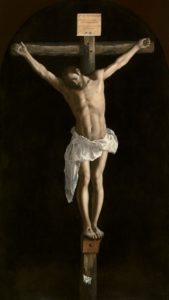
The release of Summa Familiae Cura came two days after the death of Cardinal Carlo Caffarra. Cardinal Caffarra was appointed president by Pope John Paul II when the Institute was founded in 1981. He was an influential mentor to the long-serving president and professor of moral theology, Monsignor Livio Melina. Msgr. Melina had taught at the Institute since 1986 and served as its president from 2006-2016.
Cardinal Caffarra was one of the four cardinals who signed the Dubia, a series of theological questions on Amoris Laetitia presented to Pope Francis in 2016. The document sought to force the pope to clarify any ambiguity regarding communion for divorced and remarried Catholics, among other issues. 
The Vatican’s PR machine cranked into action this summer as the Institute’s reorganization was completed and the fall semester drew close. In a press release issued on July 29, 2019 the Institute defended its changes in statues and faculty: “The academic project of the new Institute, approved by the Congregation for Catholic Education, is designed as a widening of reflection on the family, and not as a replacement of themes and topics. Such expansion, showing even more the centrality of the family in the church and in society, confirms and relaunches with new vigor the original and still fruitful intuition of St. John Paul II.”
The Vatican newspaper, L’Osservatore Romano ran an article explaining why the Institute needed to better understand families. Avvenire, Italy’s national Catholic newspaper, published an article on July 30, 2019 describing how people at the Institute had criticized the work of the two synods on the family and the post-synodal document, Amoris Laeititia. Without naming specific faculty, Luciano Moia, the author, said the attacks were especially inappropriate because they came from “the heart of an institute that should have represented the field of high-level, specialized formation, one of the drivers of renewal, not the organizer of an insurgent fraction.”
Two of the authors of that discontent were dumped from JPII’s faculty and administration: Monsignor Livio Melina, who held the Chair of Fundamental Moral Theology and Fr. Jose Noriego, who held the Chair of Specialized Moral Theology. Both were notified that their positions had been eliminated. Little wonder—Msgr. Melina insisted on interpreting the ideas contained in Amoris Laeititia in the light of Pope John Paul II’s encyclicals on family, Familiaris Consortio, and the Church’s moral teaching, Veritatis Splendor. As the gospel says, new wine in old wineskins doesn’t work.
Fr. Jose Granados, an official of the Institute, doggedly defended the old professor. “The way that you understand (the 1993 encyclical) Veritatis splendor will shape the way you view particular moral issues, such as the morality of contraception or sexual acts outside of marriage….Is it not that Melina…has remained faithful to Humanae vitae and Veritats splendor..?”
Hint: If you try to undermine the Pope it’s not healthy for your career in Catholic academia. What happened to Msgr. Melina sounds like what happened to Fr. Charles Curran and many other theologians, educators and religious during the Pope John Paul II/Pope Benedict era. There was no welcome mat for dissidents.
What horrified Fr. Granados the most was the prospect of welcoming Fr. Maurizio Chiodi to the faculty of the Institute. “Rumors now circulate that Professor Maurizio Chiodi will come to teach, who opens himself up to the lawfulness of contraception and accepts homosexual acts as ‘possible’ in some situations.” Fr. Chiodi is a professor of moral theology at the Northern University of Milan and a new member of the Pontifical Academy for Life. He has been described as a “disciple” of Cardinal Caffarra’s old adversary, German priest Bernard Haring. Fr. Haring was a Roman Catholic scholar who influenced the sweeping modernization of Vatican II by emphasizing a moral theology of Christian love rather than the cataloging of sins. He also advocated the virtue of listening. ”All of us dislike a fellow who always speaks to us and never listens,” Haring told Catholic University (DC) students in 1964. ”If the church doesn’t listen to the world, then the world will never listen to the church.”

Many church officials are going nuts over transgender people calling them unnatural, delusional, or a fad. Male and Female He Created Them: Towards a Path of Dialogue on the Question of Gender Theory in Education, was issued by the Vatican’s Congregation for Catholic Education on June 10, 2019. The document brands changing understanding toward gender identity and sexuality as a cultural and historical trend in “gender theory” that is contrary to the teachings of the Catholic Church.
How does the Vatican explain its own “gender theory” creation–the Castrati? As with most sexual and religious issues in Catholicism, misogyny is at the bottom of it. 
In 1588, Pope Sixtus V banned women from singing on stage in any public theater or opera house. They were already banned from singing in church by the Pauline dictum “mulieres in ecclesiis tacesant” (“let women keep silent in churches” 1 Corinthians, ch.14, v. 34). In 1589, in response to a demand for feminine voices to hit the high notes, Pope Sixtus V published the bull Cum Pro Nostro Pastorali Munere, reorganizing the choir at St. Peter’s Basilica specifically to include castrati. The pope was aware the public craved the “voices of angels.”
The process of castrating promising young boys to compensate for the loss of female sopranos became prevalent. This surgical manipulation of nature preserved boys’ high youthful voices although they had the vocal power of men. The promise of lucrative careers persuaded many poor Italian parents to castrate their sons if they possessed musical talent. It is believed that many operations to remove testicles were carried out by slitting the groin and severing the spermatic cord. Some boys could still achieve an erection depending on the age they were castrated.
Castrati were sexually attractive to members of both sexes. Because male castrati could not procreate, women found them particularly attractive as casual sex partners. Castrati developed the reputation of having enhanced sexual prowess due to their lack of sensation.
According to a story by author Tony Perrottet, even the famous Casanova was tempted. “Rome forces every man to become a pederast,” he sighed in his memoirs. His most confusing moment came when he met a particularly lovely teenage castrato named Bellino in an inn. Casanova was bewitched, going so far as to offer a gold doubloon to see the boy’s genitals. In an improbable twist, when Casanova grabbed Bellino in a fit of passion, he discovered a false penis: it turned out that the castrato was a girl, who historians have identified as Teresa Lanti. She had taken up the disguise to circumvent the ban on female singers in Italy. She later “came out” to perform in other European countries which did not have restrictions on female singers.
In the 17th century thousands of boys between the ages of 8 and 12 were castrated annually. While there is no exact figure, 80% are estimated to have survived the surgery. A lucky few became celebrities. The rest festered in small church choirs or became prostitutes or beggars. The castrati often grew up with feminine features and smooth, hairless bodies. Some of them were tall and gangly, others grew breasts and heavy buttocks. Castration for the sake of art was finally banned in the early 19th century. However, Italian doctors continued to create castrati until 1870. The Vatican employed them as singers in the Sistine Chapel until 1903. In truth, the church condoned—or looked the other way—when adolescent boys were castrated in order to produce males with soprano voices. 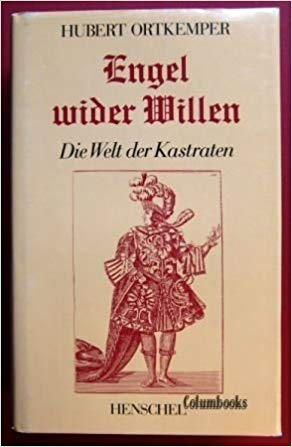
In the 1993 book, Engel wider Willen: Die Welt der Kastraten (Angels Against their Will) German historian Hubert Ortkemper said the castrato Alessandro Moreschi (1858-1922) performed in the Sistine Chapel until 1913. Moreschi lived long enough to make recordings in 1902 and 1904. You can listen to him sing, “Ave Maria” here. 
The most famous castrato, Carlo Broschi, was born in a small city in Southern Italy in 1705. Better known by his stage name Farinelli; he became the greatest opera singer of the 18th century, performing all over Europe. His stage career lasted from 1720 to 1737. He outlived most of his contemporaries and died in Bologna in 1782. In 2006, Farinelli’s remains were exhumed to be moved to another cemetery. Scientists and antiquarians took the opportunity to study the effects of castration on body development. They discovered osteoporosis and a condition called hyperostosis frontalis interna in Farinelli’s bones. These conditions are common in older, post-menopausal women. 
In his mind-blowing article “Some Men Are Born Eunuchs” former Providence College professor, Anthony Esolen, compared the castrati operations to the process of transitioning from male to female (transwomen). His verdict: “However sick it was to do that then; it is far sicker to do what we do now.” According to his reasoning, a castrated boy at least produced a beneficial outcome; a beautiful voice for art or liturgy, financial security, or social status. “He” would still be a “he.” In contrast, the “mutilation” a transwoman endures to achieve feminine characteristics does not produce a beneficial outcome, only a freak who was “troweled out for a mock vagina.” “He” wants to become a “she.” Esolen’s article is obviously meant to defend the Church’s position on gender changes and transsexuals. His loathing of feminists, homosexuals, and transsexuals is evident. But in his haste to condemn adult males who chemically and surgically transition to female, he ignores the physical changes of the castrati. They became feminine, too, with high voices, breasts, big asses and soft skin. What is also evident is his delusion that a small boy, 8, 9, or 10 years old could make the choice to be castrated. It wasn’t a noble gesture. They were pushed into the barbershop by their parents or a priest.
The strong whiff of misogyny in the Esolen article is reminiscent of Pope Sixtus V’s decree to ban women’s voices in church and the stage and substitute them with castrati. It appears that it’s better to have males with no balls in the choir than women. 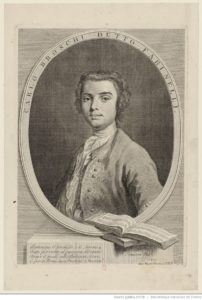
On October 15, 2017 Pope Francis announced a special synod on the Pan-Amazonian Region to take place in Rome. It is scheduled for October 6-27, 2019. 
The synod arose out of Pope Francis’ 2015 encyclical Laudato Si, “Caring for Our Common Home,” which called for action on global warming, environmental pollution and pinpointed the Amazon region as a chief area of concern.
The Pan-Amazon region spans over two million square miles within nine countries, including Brazil, Peru, Ecuador, Bolivia, Columbia, Venezuela, Suriname, Guyana and French Guyana. It is home to 33 million people, among them 3 million indigenous people representing 400 different tribes. It is the source of one-fifth of the world’s fresh water, one-fourth of all oxygen and more than one-third of global forest reserves.
Taking part in the synod will be bishops from the nine countries encompassing Amazonia, presidents of the seven bishops’ conferences, and representatives of non-governmental organizations that work in the region. Chief among them will be REPAM, or Red Eclesial PanAmazonica, an ecclesial network of bishops created in 2014 to promote the rights and dignity of people living in the Amazon. It is backed by CELAM, the Latin American Bishops’ Conference. Caritas Internationalis is a founding member. REPAM embodies the promise Pope Francis made in the Amazon town of Maldonado, Peru to affirm “a whole-hearted option for the defense of life, the defense of the earth and the defense of cultures.”
The 16-page preparatory document for the synod was published on June 8, 2018. It is titled “Amazonia: New Paths for the Church and for an Integral Ecology.”The document was written by the Vatican’s office for the synod with the help of an 18-member council appointed by Pope Francis to oversee the 2019 meeting. The synod council included three cardinals, 13 bishops, one nun and a layman. Most members are from countries in the Amazon region. The document is organized as a Preamble, Section I – Seeing, Section II – Discernment, Section III – Action, and Questionnaires that were widely circulated to provide material for each of the three sections.
The synod’s preparatory document makes clear that central issues will focus on environmental protection, the rights of indigenous people, and evangelization. But what is articulated within these issues will ignite change not only in the Amazon, but throughout the Catholic Church.
It is obvious that most pundits from Europe and North America who follow church happenings did not read this document carefully. If they did, they would be shocked. This synod is not about a group of natives in the Amazon rainforest with a few mentions of climate change thrown in. Pope Francis and the Synod Council are attempting to shift Catholic culture and religious practice from the Eurocentric and clerical sub-culture model to one drawn from values and cultures based in the Southern Hemisphere, with ripples extending to Africa and Asia. Europe’s domination of 1,000 years is ending. 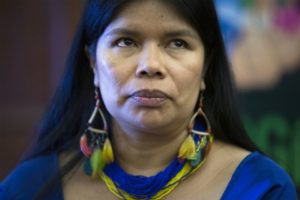
The clash of values that dominates so much of the Eurocentric Church today will be subsumed into other cultural debates. There, they may find a new voice, fade away or be viewed as irrelevant. How important are religious liberty, same-sex marriage, denying communion to pro-abortion politicians, sex abuse and cover up, women priests, married priesthood, conscience rights, “authentic” Catholic definitions, and “reform of the reform” of Vatican II in Amazonia? Newer issues like racism, rights of indigenous people, migrants and immigration, gender theory, LGBT civil rights, lay involvement, habitat protection, and economic equity should get more traction, but the results will be a mixed bag of blessings for both progressives and conservatives.
Here is what I see emerging from the Amazonia Synod:
- A new emphasis on “Integral Ecology” – everything is connected and environmental abuse as sin
- Evangelization to where people are physically and spiritually–however remote
- Older married men ordained as priests to administer the sacraments
- Increased role in ministry and governance for women
- A cultural and spiritual sift away from a Eurocentric Catholicism
Each of the sections of the preliminary document has markers and flash points intimating where Pope Francis and the Church are heading with this Synod.
- Identity and Cries of the Pan-Amazonia
“Nonetheless, the wealth of the Amazonian rainforest and rivers is being threatened by expansive economic interests, which assert themselves in various parts of the territory. Such interests lead, among other things, to the intensification of indiscriminate logging in the rainforest, as well as the contamination of rivers, lakes and tributaries (due to the indiscriminate use of agro-toxins, oil spills, legal and illegal mining, and byproducts from the production of narcotics.) Added to this is drug trafficking, which together with the above puts at risk the survival of those peoples who depend on the region’s animal and plant resources.” 
“For the indigenous peoples of the Amazon basin, the good life comes from living in communion with other people, with the world, and with the creatures of their environment, and with the Creator. Their diverse spiritualities and beliefs motivate them to live in communion with the soil, water, trees, animals, and with day and night. Wise elders – called interchangeably “payes, mestres, wayanga or chamanes”, among others – promote the harmony of people among themselves and with the cosmos. Indigenous peoples are a living memory of the mission that God has entrusted to us all: the protection of our common home.”
2. Toward a Pastoral and Ecological Conversion
“This social – and even cosmic – dimension of the mission of evangelization is particularly relevant in the Amazon region, where the interconnectivity between human life, ecosystems, and spiritual life was, and continues to be, apparent to the vast majority of its inhabitants.”
“Integral ecology, then, invites us to an integral conversion. This entails the recognition of our errors, sins, faults, failures and omissions by which we have harmed God’s creation and leads to heartfelt repentance. Only when we are aware of how our lifestyles – and the ways we produce, trade, consume, and discard – affect the life of our environment and our societies can we initiate a comprehensive change of direction.”
3. New Paths for a Church with an Amazonian Face
“The Church is called to deepen her identity in accordance with the realities of each territory and to grow her spirituality by listening to the wisdom of her peoples. Therefore, the Special Assembly for the Pan-Amazonian Region is invited to find new ways of developing the Amazonian face of the Church and to respond to situations of injustice in the region, such as the neocolonialism of the extractive industries, infrastructure projects that damage its biodiversity, and the imposition of cultural and economic models which are alien to the lives of its people.”
“In this sense, Vatican II reminds us that all the People of God share in the priesthood of Christ, although it distinguishes between common priesthood and the ministerial priesthood. This gives way to an urgent need to evaluate and rethink the ministries that today are required to respond to the objectives of “a Church with a native face.”
“It is necessary to identify the type of official ministry that can be conferred on women, taking into account the central role which women play today in the Amazonian Church. It is also necessary to foster indigenous and local-born clergy, affirming their own cultural identity and values. Finally, new ways should be considered for the People of God to have better and more frequent access to the Eucharist, the center of Christian life.”
The Synod’s preparatory document cites a wide swath of church documents, three provide the biggest stamp:
1. Laudato Si – (“Praise Be to You”) The 2nd encyclical of Pope Francis has the subtitle, “On Care for Our Common Home.” In it, Pope Francis critiques consumerism and irresponsible development, and laments environmental degradation and global warning. It calls on the peoples of the world to act. The encyclical was published on June 18, 2015.
2. The Aparecida Document – This document summarized the 2007 meeting of CELAM—the regional Episcopal Conference of Latin America and the Caribbean. The meeting was held in Aparecida, Brazil, and was chaired by Cardinal Jorge Bergoglio, the future Pope Francis. In the document, the Latin American bishops expressed what they believed to be keys in keeping Catholicism alive and relevant in Latin American. Those “keys” included a preferential option for the poor and marginalized, and a serious concern for the environment.
3. Pope Francis’ January 19, 2018 Address to the Indigenous People of Amazonia at Maldonado, Peru – During his trip to Chile and Peru, Pope Francis met and addressed thousands of native Amazonians in an indoor stadium at Puerto Maldonado, a city on Peru’s Amazon frontier. It is the capital of Madre de Dios, a region plagued by illegal mining and human trafficking. In his remarks, the pope noted that the “native Amazonian peoples have probably never been so threatened on their own lands as they are at present.” He spoke about threats from extractive exploitation, environmental contamination and illegal mining. He also addressed the oppression of native people by certain policies and movements under the guise of preserving nature that deprive them of their land, natural resources and livelihoods. Pope Francis promised participants to affirm a “whole-hearted option for the defense of life, the defense of the earth and the defense of cultures.”
There are several key players in the development of the Synod Council and preparatory document. Since I don’t read Spanish, and there is very little coverage of South America by U.S. journalists, I may have missed a few names but I believe I netted the biggest fish.
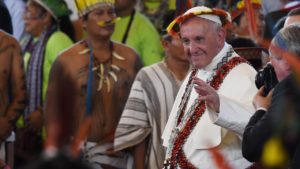
Pope Francis
Born in Buenos Aires, Argentina on December 17, 1936, Jorge Mario Bergoglio became Pope Francis on March 13, 2013, when he was named 266th pope of the Roman Catholic Church. Bergoglio, the first pope from South America, took his papal title after St. Francis of Assisi of Italy. The first Jesuit pope, Bergoglio was ordained in 1969, and from 1973-1979 was the provincial superior for Argentina. Prior to his election as pope, Bergoglio served as archbishop of Buenos Aires from 1998-2013. He was named a cardinal by Pope John Paul II in 2001. In his six years as pope, Francis has championed the world’s poor and marginalized people, emphasized mercy over rules, and been actively involved in environmental advocacy and political diplomacy.
“We are not faced with two separate crisis, one environmental and the other social, but rather one complex crisis which is both social and environmental.”

Cardinal Lorenzo Baldisseri
Cardinal Baldisseri has served as general secretary of the Synod of Bishops since September 21, 2013. He introduced and explained in depth the Amazonia synod’s preparatory document during the Vatican press conference on June 8, 2018. Hand-picked by Francis to reorganize the Synod of Bishops, Cardinal Baldisseri is a veteran of the Vatican diplomatic corps. He has served as apostolic nuncio to Paraguay, India, Nepal and Brazil (2002-2012). In Brazil, he negotiated an agreement regulating the juridical status of the church.
“Although the theme refers to a specific territory, such as the Pan-Amazon region – and this is why we speak about the “Pan-Amazon Synod” – the reflections that concern it go beyond the regional context, because they regard the whole Church and also the future of the planet. These reflections are intended to bridge to other similar geographical realities such as, for example, the Congo basin, the Central American biological corridor, the tropical forests of Asia in the Pacific, and the Guarani aquifer system. This great ecclesial, civic and ecological project allows us to extend our gaze beyond their respective borders and to redefine pastoral lines, making them suitable for today’s times. For these reasons too the Synod will be held in Rome.”
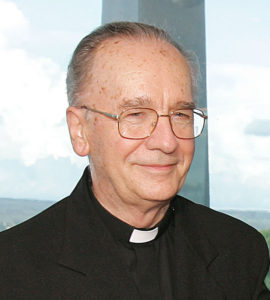
Cardinal Claudio Hummes
Pope Frances chose Brazil’s Cardinal Claudio Hummes to serve as regulator general of the October synod on Amazonia. The nomination of the 84-year-old retired archbishop of Sao Paulo was announced at the Vatican on May 4, 2019. The regular is responsible for providing a comprehensive outline of the synod’s theme at the beginning of the meeting and for summarizing the speeches of synod members before work begins on concrete proposals for the pope. Cardinal Hummes was a former perfect of the Congregation for Clergy and has been a close friend of the pope since Jorge Mario Bergoglio was archbishop of Buenos Aires. Cardinal Hummes currently serves as president of REPAM, or the Red Eclesial Pan-Amazonica (or Pan-Amazonian Ecclesial Network.) Founded in 2014, REPAM is a network backed by the Latin American Bishops Conference to promote the rights and dignity of people living in the Amazon. Caritas Internationalis is a founding member.
“Back in 2015 the pope started to tell me, “I’m thinking of convening a meeting of all the bishops of Amazonia. As of yet, I don’t know what type of meeting or assembly, but I think that it could even be a synod.” He said to me, Let us pray about it together, and he began to speak to the bishops, to the episcopal conferences of the Amazonian region, about how to have an assembly, and so in his heart there grew the idea of a synod, and eventually in 2017 he convoked it. We have worked hard for the synod, and we will continue to do so in this very important service for the future. The synod serves to find and trace new paths for the Church.”
“We know now there is another step to take: we have to promote an indigenous Church for the indigenous peoples, to help give birth to and nurture the growth of an indigenous Church. The aboriginal communities that hear the Gospel proclamation in one way or another, and that embrace it, which is to say, they welcome Jesus Christ, have to be able to ensure that, through an opportune process, their faith can become incarnate and inculturated in their traditional reality. Then, in the context of their culture, identity, history and spirituality, an indigenous Church can arise with its own pastors and ordained ministers, always united within itself, and in total communion with the universal Catholic Church, but inculturated in indigenous cultures.”

Cardinal Ricardo Barreto Jimeno
A Jesuit, and archbishop of Huancayo, Peru since 2004, Cardinal Barreto is vice president of the Peruvian bishops’ conference. He is also vice president of REPAM (Red Eclesial Pan-Amazonica). According to Cardinal Barreto, “new paths” will be defined during the synod, directed toward care for creation and evangelization.
Cardinal Barreto has long been a proponent of environmental protection. Back in 2005 he told his brother bishops during a synod that bread and wine offered at the altar were no good if the land they came from was not properly cared for. “I said that if we offer bread from land that’s contaminated, we are offering God a contaminated fruit. And the same for wine…I remember that the bishops looked at me as if they were saying, ‘What does the Eucharist have to do with ecology?’”
“Too many people think the indigenous in the Amazon are savages with nothing to teach us. ..as one Amazonian indigenous person told me, the savages are the ones who wear suits and ties and have money because they not only exploit natural resources irrationally but also expel (the indigenous people) from their territories and allow those from the outside to attack their culture simply to profit.”

General Augusto Heleno Ribeiro Pereira
Augusto Heleno, 72, is a Brazilian politician and retired general. He was military commander of the Amazon and chief of the Department of Science and Technology of the Army. He was chosen by Brazil’s newly elected president, Jair Bolsonaro, to head the Institutional Security Cabinet, an executive level office of the federal government responsible for assistance to the president on matters of national security and defense policy.
Bolsonaro campaigned on promises to end protections of the Amazon rainforest and limit Brazil’s indigenous peoples’ rights to designate land in the river’s sprawling basin as preserves. In one of his first acts as president, he gave responsibility for indigenous preserves to the Agriculture Ministry, which is seen as heavily influenced by agribusiness interests.
A major Brazilian newspaper, O Estado de S. Paulo, reported on February 10, 2019 that the synod has become a national concern for the Brazilian government. General Augusto Heleno was quoted in the story as saying, in reference to the synod, “We are worried about it and want to neutralize it.” The government’s strategy for neutralizing the Amazonia synod reportedly includes planting intelligence agents to monitor preparatory meetings and putting diplomatic pressure on the Italian government to intercede with the Vatican to avoid, or at least tone down, criticism of Brazil’s Amazon policies.
“There are foreign (non-governmental organizations) and international authorities who want to intervene in our treatment of the Brazilian Amazon…I’m worried that this Synod is going to interfere in our sovereignty. We know what we have to do. We know how to do sustainable development, to stop deforestation.”

Mauricio Lopez
Mauricio Lopez is the executive secretary of REPAM. He was the one lay person appointed to the Synod Council by Pope Francis. Lopez grew up in Mexico and was educated in Jesuit schools. He and his wife, who is Ecuadorian, moved to Ecuador over a decade ago. In 2009, he took a trip to the part of the Amazon basin that sits on Ecuador’s eastern borders. “I came by bus from the highest mountains with snow,” he described, and suddenly I entered this beautiful place, where I saw the biggest river, the entrance into the Amazon, and how the flora and fauna were always changing as we went down, down, down. The temperature changed radically, and I felt, too, a change within me,” he said.
“The Amazon reality requires us to be a braver and more prophetic church.”
The Amazonia initiative brings back an echo of my own past. 
Back in the mid-1970s, as a young woman in Alaska, I fought for large tracts of Alaskan lands to be preserved as wilderness areas–national parks, refuges and monuments. I wanted government agencies to insist on environmental protections for areas that were mined, logged or slated for oil and natural gas extraction. The native peoples of Alaska—Tlingit, Haida, Tsimshian, Athabascan, Aleut, Inupiat and Yupik were different, but each group was deeply connected to the land by a deep love for it, cultural heritage and identity. One connection was through the subsistence lifestyle—fishing, trapping, hunting and harvesting on their ancestral lands.
During that time, I never heard a religious person—priest, religious sister, bishop, pastoral associate, anyone—speak up for Alaska natives or for wise natural resources management. At that time, the Catholic church made no connection between Nature and Faith. I missed having my faith strengthen my environmental activism and support for native land rights; and my love for the land and forest strengthen my spirituality and religious conviction.
It now seems like a dream come true; one I have waited almost 40 years to see. Thank you, Pope Francis, and everyone who is making the Amazonia Synod happen. I’ll be praying for you and us.
|










































